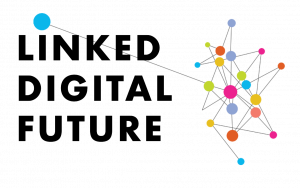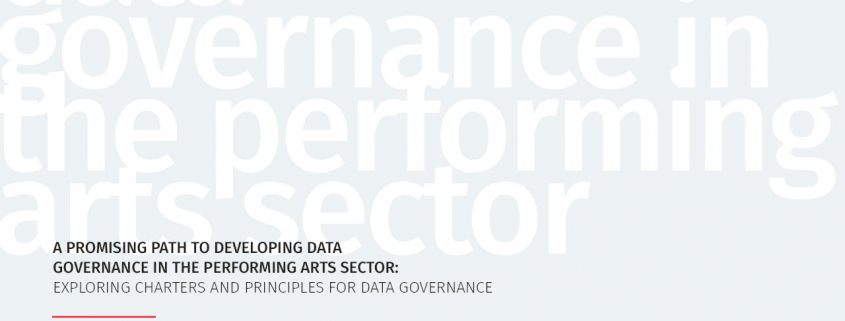Authors: Ayesha Zamudio-Vazquez (Open North), Megan Wylie (Open North)
A summary of what we heard from our speakers and you to continue this work on data governance of open linked metadata.
Thank you to all of the participants who joined us on November 8th, 2021 for the webinar: Data Governance in the Performing Arts: Findings and Dialogue. The discussion was so rich that we want to offer you a recap.
The Report
In 2020, Open North partnered with CAPACOA to explore the use of a data charter to improve data collaboration in the Canadian performing arts sector. As a result of this work, the two organizations launched the report A promising path to developing data governance in the performing arts sector: Exploring charters and principles for data governance.
The Event
On November 8th, CAPACOA held the event, Data Governance in the Performing Arts: Findings and Dialogue, which brought together the report researchers and partners to explore how to take the learnings forward and apply them to challenges in the sector.
Speaker Remarks
After an introduction on data governance by Lauriane Gorce, the report authors and key partners shared their takeaways from the research project (Megan Wylie, Frédéric Julien, Viêt Cao, Tammy Lee, and Marie-Pier Blain). One consistent finding across the team was the need to focus on creating tangible value for performing artists and organizations.
Data as potential value(s)
It is first important to understand what is meant by data and data governance, explained Lauriane Gorce, from Open North. Data are not inherently good or bad, structured or chaotic. Data are inert and have only a potential value. It is only through the decisions made about this data that value can be realized. Data governance encompasses all the factors that influence decisions and create value.
Different groups of stakeholders may value the same dataset differently depending upon their principles, worldview, or interests. This leads to not only one potential value, but several. For example, stakeholders could want to maximize monetary value or nudge individual behavior.
The value sought will influence which elements of the world will be represented as data (and which will not). A diversity of factors influencing decisions, values sought, and scales of action, shape very different examples of data governance.
Setting principles
The research found that principles are high-level “rules” or agreed-upon ideal norms that shape the design of structures, activities, and processes. Principles help align people around a single vision, providing a compass to guide their actions or catalyzing new collaborations between members with shared interests. They often reflect group consensus.
As Megan Wyle outlined, the research explored three types of principles: purpose-centric, data-centric, and people-centric. You can see principles that emerged as important to those in the sector in the research report. For example, data ownership or the right to be forgotten.
Open data is a hard sell for resource-strapped organizations
One of the key activities that helped us gain insight on data charters and data principles was a survey we conducted in February 2021.
As Frédéric Julien pointed out, our results highlighted that there’s a clear interest in open data. Nearly one in two survey respondents had published open data (24.4%) or were considering it (21.7%). The lack of interoperability between datasets was by far the greatest foreseen challenge (75%) by organizations publishing their data. Interoperability is a problem that can be overcome. In reality, the most significant obstacle was the lack of capacity (skills, knowledge, know-how) to open data from performing arts organizations. Organizations lack human and financial resources.
This situation leaves cultural workers wondering what’s in it for me?
The point of publishing open data is to allow others to use it. Therefore, the benefits do not immediately accrue to the provider of open data but rather to consumers of open data. This is a chicken-and-egg problem: applications powered by open data are needed to illustrate the benefits of open data, but such applications can’t work unless data providers agree to release open data!! So where do we start? Viêt Cao provided a few answers.
Where do we start?
It is important to make a distinction between opening and sharing data. Multiple factors should be taken into account to determine which is more suitable: open data or shared data. The factors to consider are the nature of data (e.g. personal, metadata, a mix), sensitivity (e.g. data producers, data subject) and how will these factors change after the data is modified (e.g. joined with other datasets). The report results suggested that in the performing arts sector sharing data is preferred over opening data.
So, where do we start? Three possibilities are foreseen.
- A data-centric perspective that focuses on the data and technology
- A purpose-centric route that focuses more on the objectives and benefits expected by individuals; and
- A people-centric approach of collaborating with people and partners.
A data charter can prove useful no matter what approach you take. Constructing principles is a matter of scale; start small, and adopt principles over time. Here, Tammy Lee offered a good insight.
Principles to optimize data reuse
Artsdata is a data infrastructure (or a knowledge graph) designed by Culture Creates to enable reuse of open performing arts event metadata. The benefit of having an interoperable knowledge graph is that it can be used by anyone, by any machine, by any software. This framework allows for data integration, unification, analytics, and data sharing via the semantic web. The output is interlinked data that increases the online discoverability of events.
Tammy Lee explained that Arstdata is built using FAIR data principles to optimize data for reuse. FAIR stands for Findable, Accessible, Interoperable, and Reusable. The full potential value of structured metadata is harnessed by capturing, storing, and integrating it in a knowledge graph making access as easy as possible with a protocol that is open, free, and universally implementable.
The team of dia-log is working its way through it!
Collaboration for the shared knowledge
According to Marie-Pier Blain, project dia-log is framed by the principles endorsed by its stakeholders: protection of sensitive data, data standardization, accessibility at low cost over a multi-year horizon, serving the collective interests and continuously sharing knowledge to break down silos.
Along with Culture Creates, they’ve developed a governance model. The model is halfway between centralization and distribution. It proposes a data governance approach bringing together representatives from the entire data chain, delegating governance mandates, activities, and responsibilities to several sub-groups that are operationalized according to common strategies, standards, and processes.
Stay Connected!
If you attended the event and would like to provide feedback – please share your thoughts with us by filling out this short survey. We would love to hear from you!
Want to stay in the loop? Join our mailing list to be notified of upcoming opportunities to collaborate on data governance.







Leave a Reply
Want to join the discussion?Feel free to contribute!